Database Architect Resume Examples

Jul 18, 2024
|
12 min read
"Mastering your database architect resume: Building a strong foundation for your job search with tips and tools to showcase your expertise and land your dream job."
Rated by 348 people
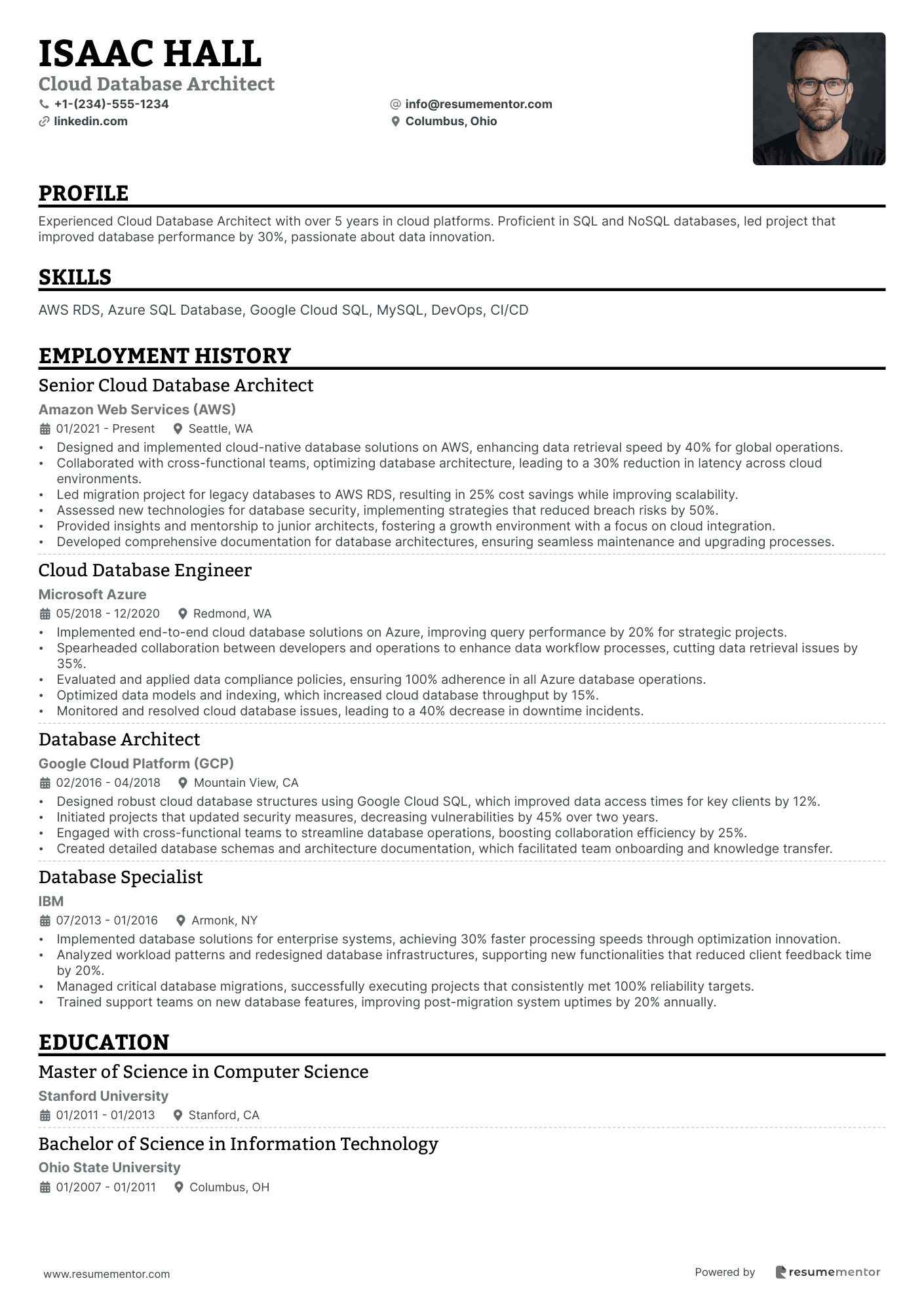
Cloud Database Architect
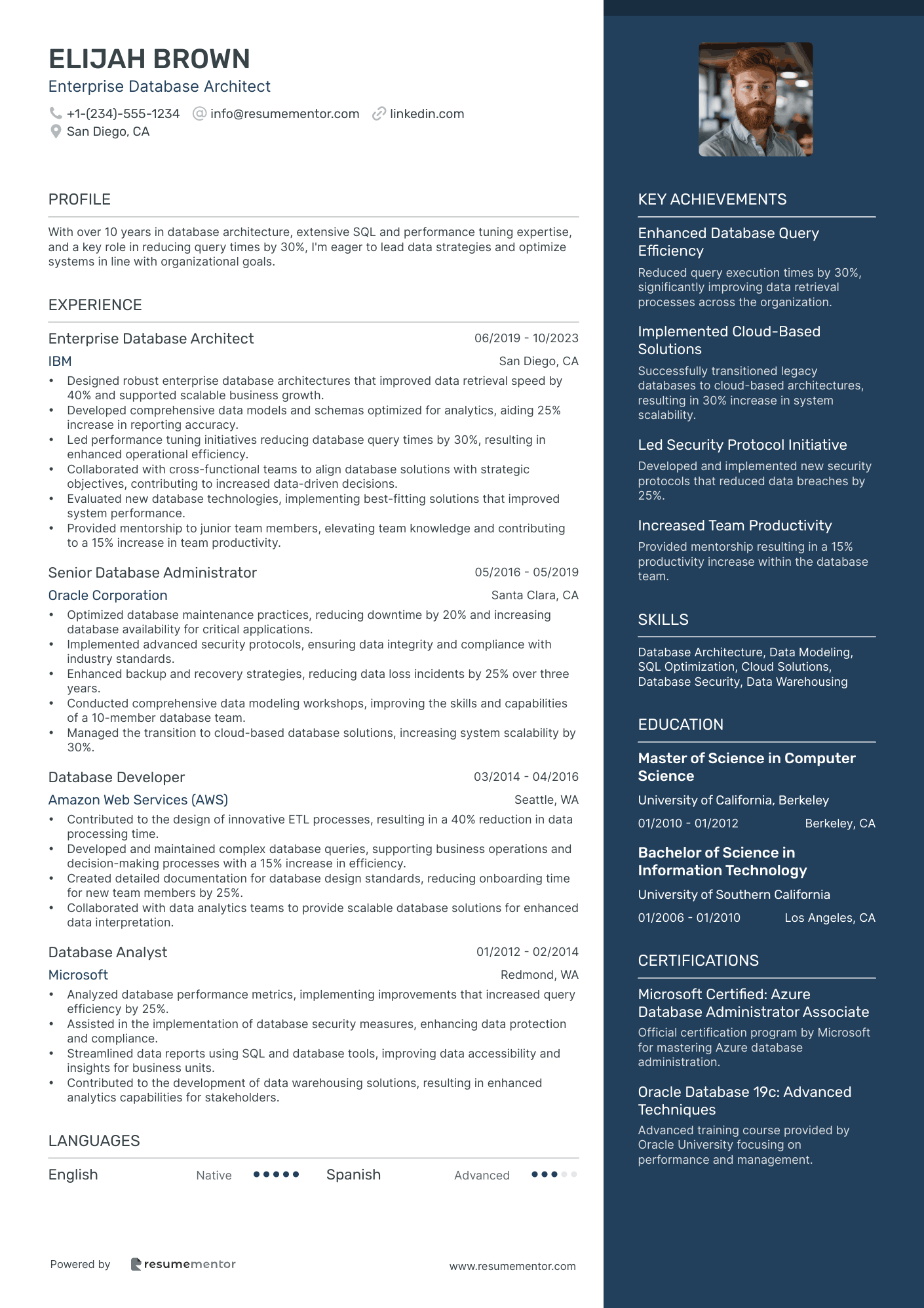
Enterprise Database Architect
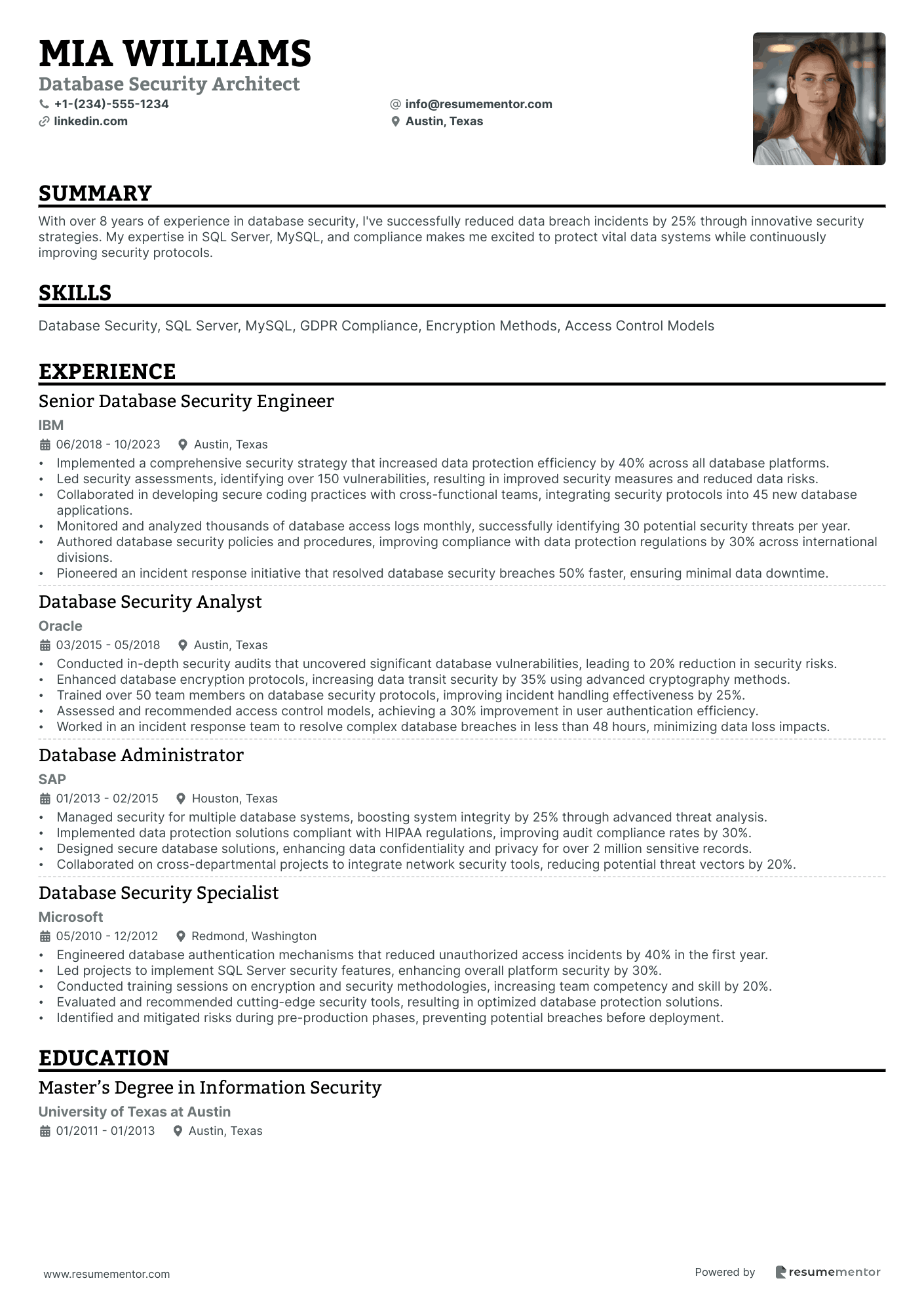
Database Security Architect
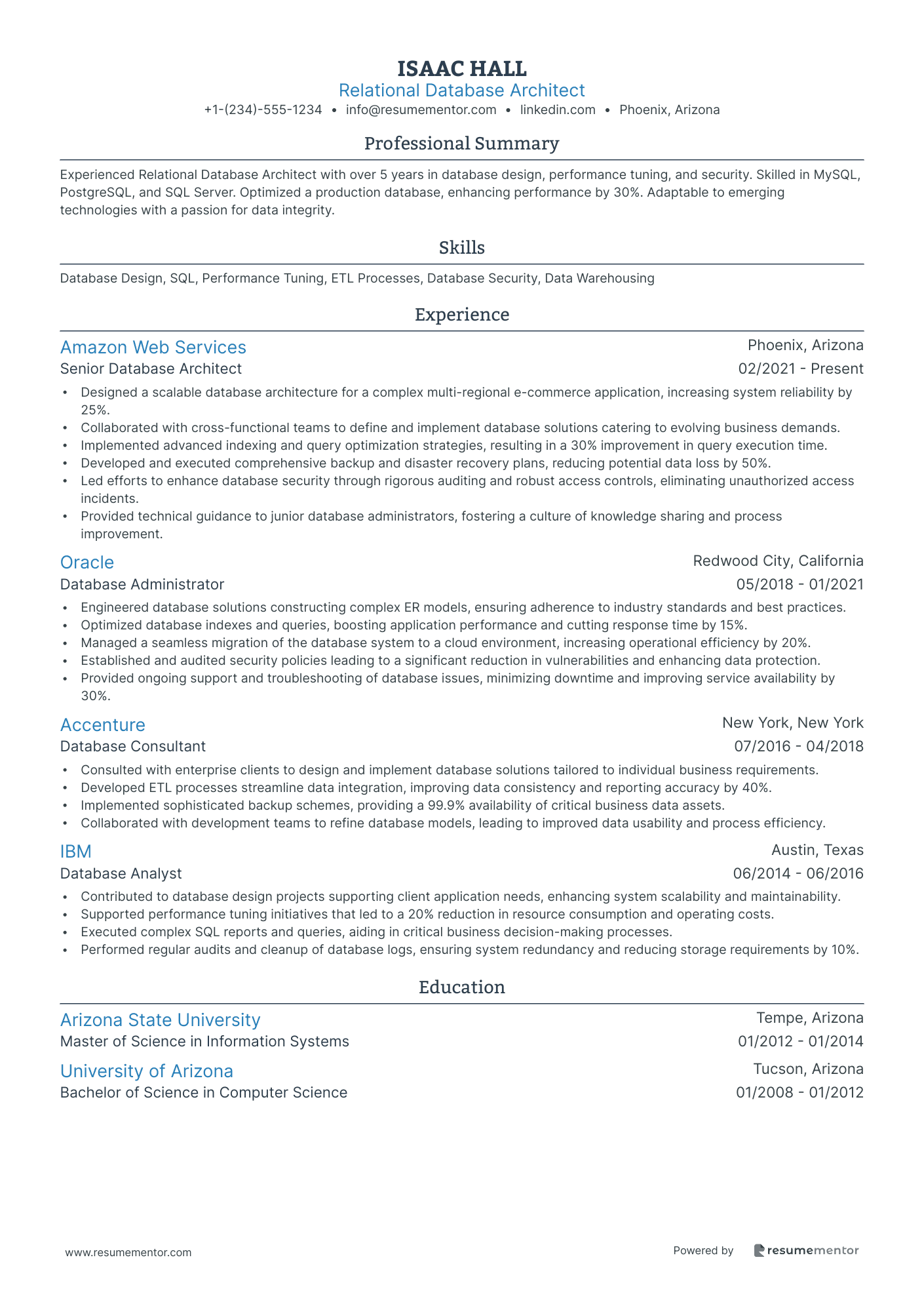
Relational Database Architect
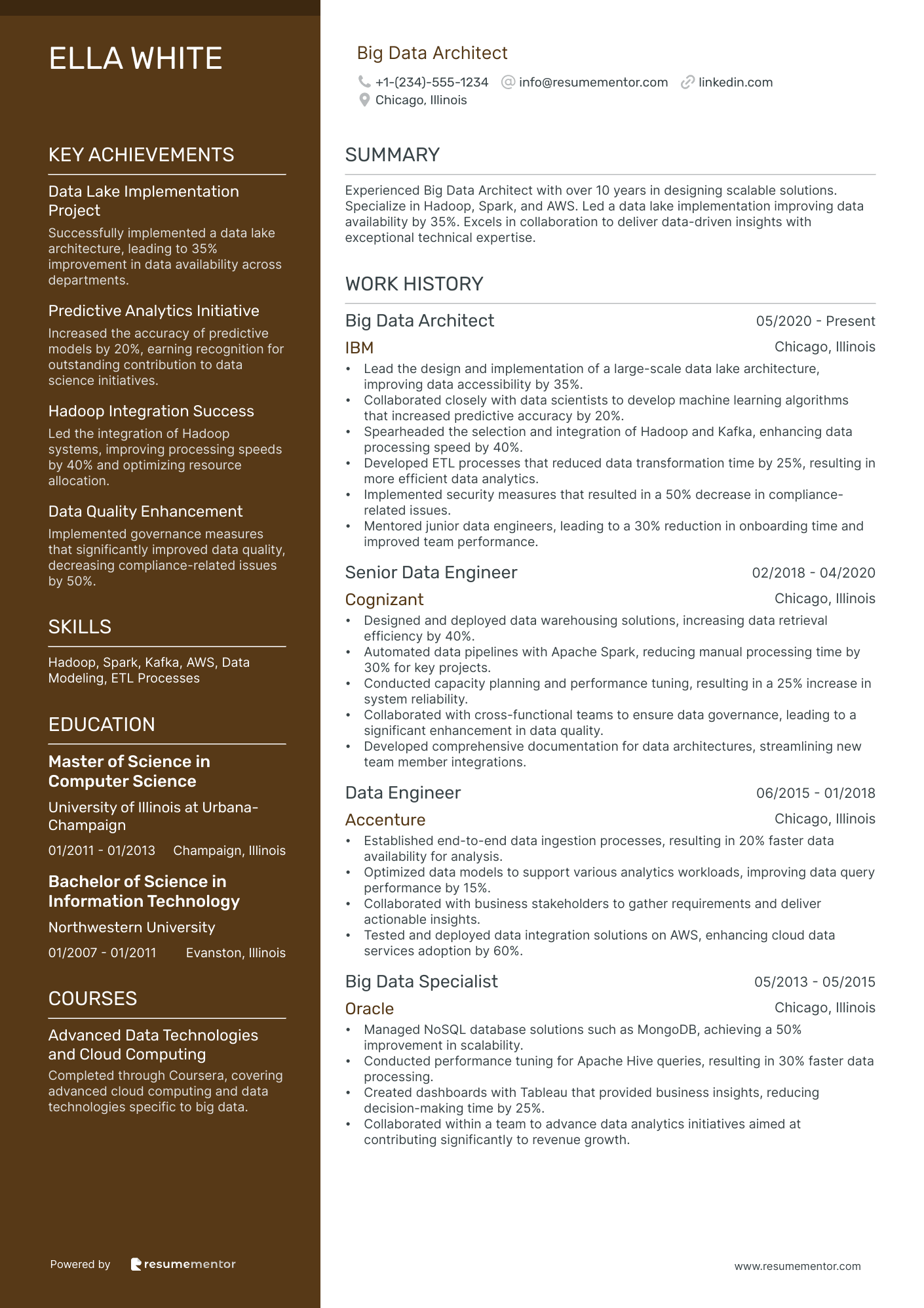
Big Data Architect
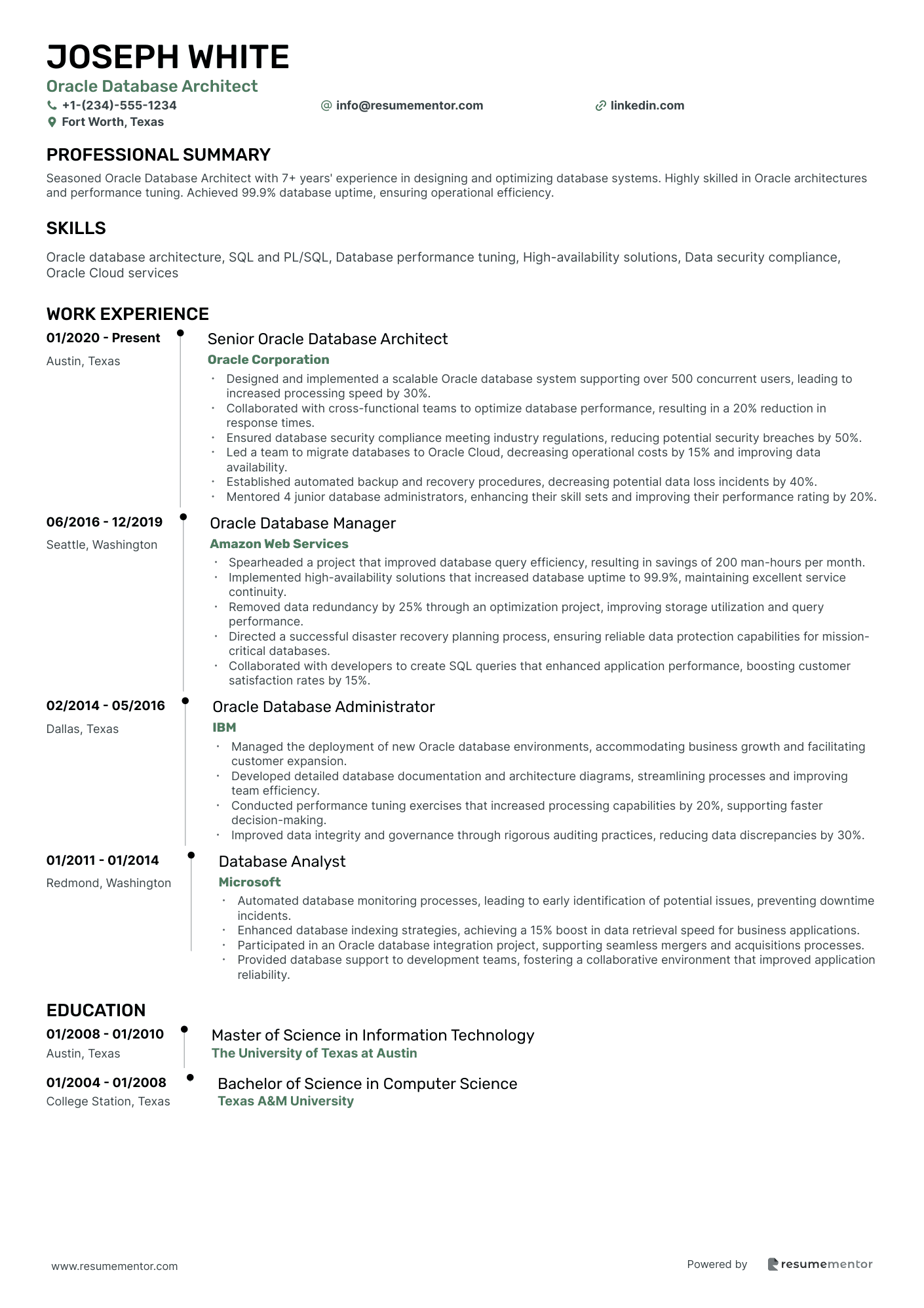
Oracle Database Architect
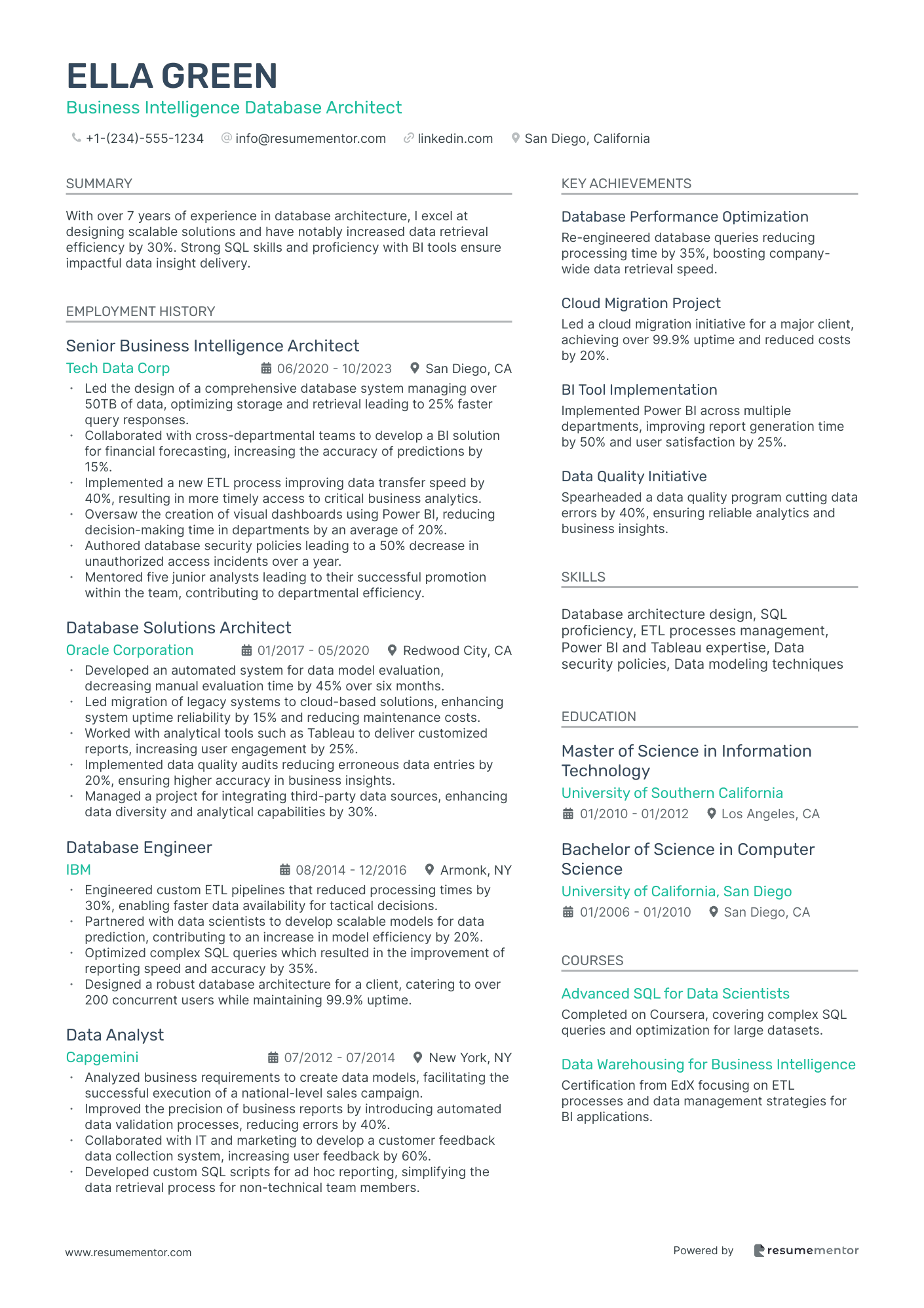
Business Intelligence Database Architect
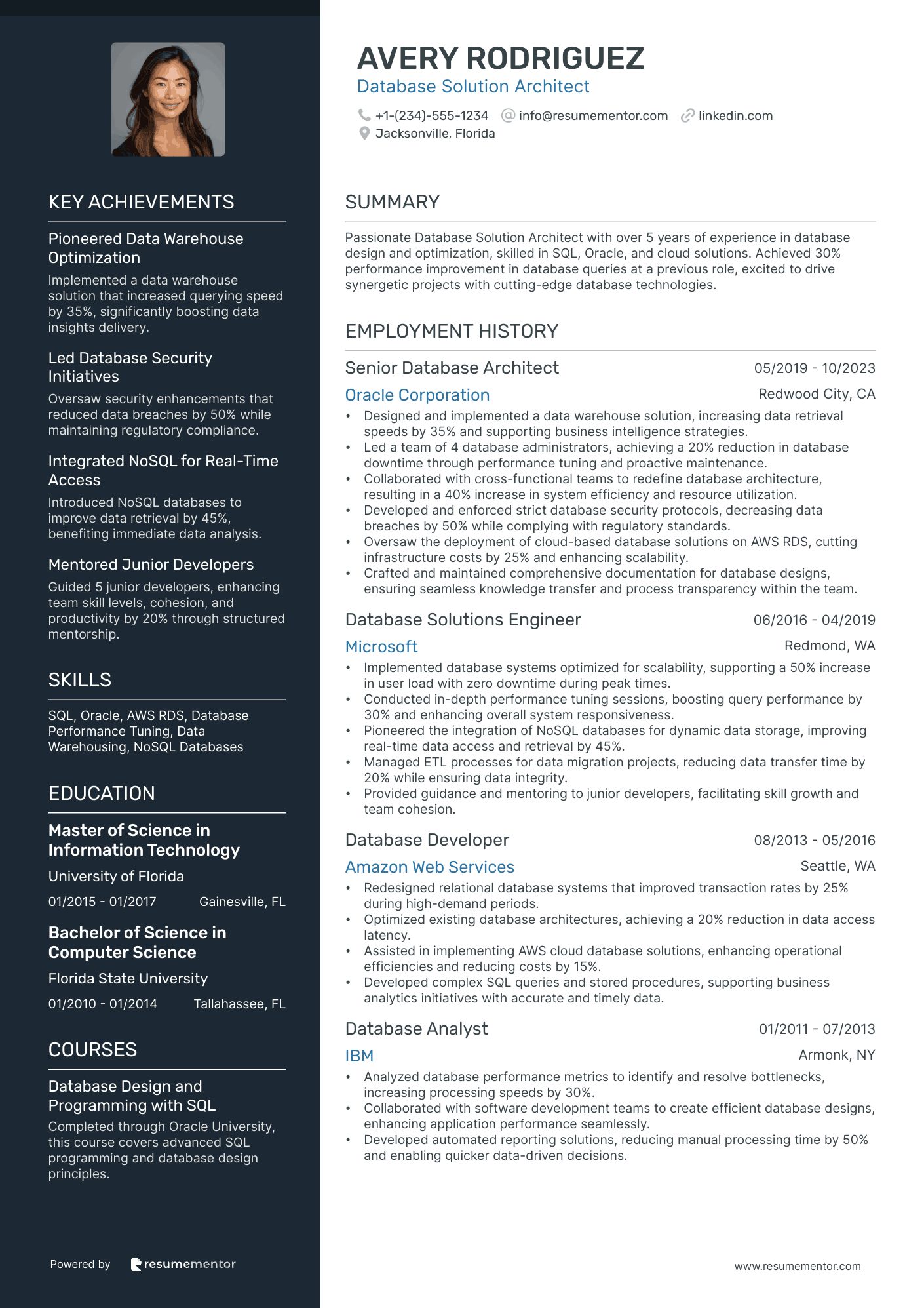
Database Solution Architect

Cloud Database Architect resume sample
- •Designed and implemented cloud-native database solutions on AWS, enhancing data retrieval speed by 40% for global operations.
- •Collaborated with cross-functional teams, optimizing database architecture, leading to a 30% reduction in latency across cloud environments.
- •Led migration project for legacy databases to AWS RDS, resulting in 25% cost savings while improving scalability.
- •Assessed new technologies for database security, implementing strategies that reduced breach risks by 50%.
- •Provided insights and mentorship to junior architects, fostering a growth environment with a focus on cloud integration.
- •Developed comprehensive documentation for database architectures, ensuring seamless maintenance and upgrading processes.
- •Implemented end-to-end cloud database solutions on Azure, improving query performance by 20% for strategic projects.
- •Spearheaded collaboration between developers and operations to enhance data workflow processes, cutting data retrieval issues by 35%.
- •Evaluated and applied data compliance policies, ensuring 100% adherence in all Azure database operations.
- •Optimized data models and indexing, which increased cloud database throughput by 15%.
- •Monitored and resolved cloud database issues, leading to a 40% decrease in downtime incidents.
- •Designed robust cloud database structures using Google Cloud SQL, which improved data access times for key clients by 12%.
- •Initiated projects that updated security measures, decreasing vulnerabilities by 45% over two years.
- •Engaged with cross-functional teams to streamline database operations, boosting collaboration efficiency by 25%.
- •Created detailed database schemas and architecture documentation, which facilitated team onboarding and knowledge transfer.
- •Implemented database solutions for enterprise systems, achieving 30% faster processing speeds through optimization innovation.
- •Analyzed workload patterns and redesigned database infrastructures, supporting new functionalities that reduced client feedback time by 20%.
- •Managed critical database migrations, successfully executing projects that consistently met 100% reliability targets.
- •Trained support teams on new database features, improving post-migration system uptimes by 20% annually.
Enterprise Database Architect resume sample
- •Designed robust enterprise database architectures that improved data retrieval speed by 40% and supported scalable business growth.
- •Developed comprehensive data models and schemas optimized for analytics, aiding 25% increase in reporting accuracy.
- •Led performance tuning initiatives reducing database query times by 30%, resulting in enhanced operational efficiency.
- •Collaborated with cross-functional teams to align database solutions with strategic objectives, contributing to increased data-driven decisions.
- •Evaluated new database technologies, implementing best-fitting solutions that improved system performance.
- •Provided mentorship to junior team members, elevating team knowledge and contributing to a 15% increase in team productivity.
- •Optimized database maintenance practices, reducing downtime by 20% and increasing database availability for critical applications.
- •Implemented advanced security protocols, ensuring data integrity and compliance with industry standards.
- •Enhanced backup and recovery strategies, reducing data loss incidents by 25% over three years.
- •Conducted comprehensive data modeling workshops, improving the skills and capabilities of a 10-member database team.
- •Managed the transition to cloud-based database solutions, increasing system scalability by 30%.
- •Contributed to the design of innovative ETL processes, resulting in a 40% reduction in data processing time.
- •Developed and maintained complex database queries, supporting business operations and decision-making processes with a 15% increase in efficiency.
- •Created detailed documentation for database design standards, reducing onboarding time for new team members by 25%.
- •Collaborated with data analytics teams to provide scalable database solutions for enhanced data interpretation.
- •Analyzed database performance metrics, implementing improvements that increased query efficiency by 25%.
- •Assisted in the implementation of database security measures, enhancing data protection and compliance.
- •Streamlined data reports using SQL and database tools, improving data accessibility and insights for business units.
- •Contributed to the development of data warehousing solutions, resulting in enhanced analytics capabilities for stakeholders.
Database Security Architect resume sample
- •Implemented a comprehensive security strategy that increased data protection efficiency by 40% across all database platforms.
- •Led security assessments, identifying over 150 vulnerabilities, resulting in improved security measures and reduced data risks.
- •Collaborated in developing secure coding practices with cross-functional teams, integrating security protocols into 45 new database applications.
- •Monitored and analyzed thousands of database access logs monthly, successfully identifying 30 potential security threats per year.
- •Authored database security policies and procedures, improving compliance with data protection regulations by 30% across international divisions.
- •Pioneered an incident response initiative that resolved database security breaches 50% faster, ensuring minimal data downtime.
- •Conducted in-depth security audits that uncovered significant database vulnerabilities, leading to 20% reduction in security risks.
- •Enhanced database encryption protocols, increasing data transit security by 35% using advanced cryptography methods.
- •Trained over 50 team members on database security protocols, improving incident handling effectiveness by 25%.
- •Assessed and recommended access control models, achieving a 30% improvement in user authentication efficiency.
- •Worked in an incident response team to resolve complex database breaches in less than 48 hours, minimizing data loss impacts.
- •Managed security for multiple database systems, boosting system integrity by 25% through advanced threat analysis.
- •Implemented data protection solutions compliant with HIPAA regulations, improving audit compliance rates by 30%.
- •Designed secure database solutions, enhancing data confidentiality and privacy for over 2 million sensitive records.
- •Collaborated on cross-departmental projects to integrate network security tools, reducing potential threat vectors by 20%.
- •Engineered database authentication mechanisms that reduced unauthorized access incidents by 40% in the first year.
- •Led projects to implement SQL Server security features, enhancing overall platform security by 30%.
- •Conducted training sessions on encryption and security methodologies, increasing team competency and skill by 20%.
- •Evaluated and recommended cutting-edge security tools, resulting in optimized database protection solutions.
- •Identified and mitigated risks during pre-production phases, preventing potential breaches before deployment.
Relational Database Architect resume sample
- •Designed a scalable database architecture for a complex multi-regional e-commerce application, increasing system reliability by 25%.
- •Collaborated with cross-functional teams to define and implement database solutions catering to evolving business demands.
- •Implemented advanced indexing and query optimization strategies, resulting in a 30% improvement in query execution time.
- •Developed and executed comprehensive backup and disaster recovery plans, reducing potential data loss by 50%.
- •Led efforts to enhance database security through rigorous auditing and robust access controls, eliminating unauthorized access incidents.
- •Provided technical guidance to junior database administrators, fostering a culture of knowledge sharing and process improvement.
- •Engineered database solutions constructing complex ER models, ensuring adherence to industry standards and best practices.
- •Optimized database indexes and queries, boosting application performance and cutting response time by 15%.
- •Managed a seamless migration of the database system to a cloud environment, increasing operational efficiency by 20%.
- •Established and audited security policies leading to a significant reduction in vulnerabilities and enhancing data protection.
- •Provided ongoing support and troubleshooting of database issues, minimizing downtime and improving service availability by 30%.
- •Consulted with enterprise clients to design and implement database solutions tailored to individual business requirements.
- •Developed ETL processes streamline data integration, improving data consistency and reporting accuracy by 40%.
- •Implemented sophisticated backup schemes, providing a 99.9% availability of critical business data assets.
- •Collaborated with development teams to refine database models, leading to improved data usability and process efficiency.
- •Contributed to database design projects supporting client application needs, enhancing system scalability and maintainability.
- •Supported performance tuning initiatives that led to a 20% reduction in resource consumption and operating costs.
- •Executed complex SQL reports and queries, aiding in critical business decision-making processes.
- •Performed regular audits and cleanup of database logs, ensuring system redundancy and reducing storage requirements by 10%.
Big Data Architect resume sample
- •Lead the design and implementation of a large-scale data lake architecture, improving data accessibility by 35%.
- •Collaborated closely with data scientists to develop machine learning algorithms that increased predictive accuracy by 20%.
- •Spearheaded the selection and integration of Hadoop and Kafka, enhancing data processing speed by 40%.
- •Developed ETL processes that reduced data transformation time by 25%, resulting in more efficient data analytics.
- •Implemented security measures that resulted in a 50% decrease in compliance-related issues.
- •Mentored junior data engineers, leading to a 30% reduction in onboarding time and improved team performance.
- •Designed and deployed data warehousing solutions, increasing data retrieval efficiency by 40%.
- •Automated data pipelines with Apache Spark, reducing manual processing time by 30% for key projects.
- •Conducted capacity planning and performance tuning, resulting in a 25% increase in system reliability.
- •Collaborated with cross-functional teams to ensure data governance, leading to a significant enhancement in data quality.
- •Developed comprehensive documentation for data architectures, streamlining new team member integrations.
- •Established end-to-end data ingestion processes, resulting in 20% faster data availability for analysis.
- •Optimized data models to support various analytics workloads, improving data query performance by 15%.
- •Collaborated with business stakeholders to gather requirements and deliver actionable insights.
- •Tested and deployed data integration solutions on AWS, enhancing cloud data services adoption by 60%.
- •Managed NoSQL database solutions such as MongoDB, achieving a 50% improvement in scalability.
- •Conducted performance tuning for Apache Hive queries, resulting in 30% faster data processing.
- •Created dashboards with Tableau that provided business insights, reducing decision-making time by 25%.
- •Collaborated within a team to advance data analytics initiatives aimed at contributing significantly to revenue growth.
Oracle Database Architect resume sample
- •Designed and implemented a scalable Oracle database system supporting over 500 concurrent users, leading to increased processing speed by 30%.
- •Collaborated with cross-functional teams to optimize database performance, resulting in a 20% reduction in response times.
- •Ensured database security compliance meeting industry regulations, reducing potential security breaches by 50%.
- •Led a team to migrate databases to Oracle Cloud, decreasing operational costs by 15% and improving data availability.
- •Established automated backup and recovery procedures, decreasing potential data loss incidents by 40%.
- •Mentored 4 junior database administrators, enhancing their skill sets and improving their performance rating by 20%.
- •Spearheaded a project that improved database query efficiency, resulting in savings of 200 man-hours per month.
- •Implemented high-availability solutions that increased database uptime to 99.9%, maintaining excellent service continuity.
- •Removed data redundancy by 25% through an optimization project, improving storage utilization and query performance.
- •Directed a successful disaster recovery planning process, ensuring reliable data protection capabilities for mission-critical databases.
- •Collaborated with developers to create SQL queries that enhanced application performance, boosting customer satisfaction rates by 15%.
- •Managed the deployment of new Oracle database environments, accommodating business growth and facilitating customer expansion.
- •Developed detailed database documentation and architecture diagrams, streamlining processes and improving team efficiency.
- •Conducted performance tuning exercises that increased processing capabilities by 20%, supporting faster decision-making.
- •Improved data integrity and governance through rigorous auditing practices, reducing data discrepancies by 30%.
- •Automated database monitoring processes, leading to early identification of potential issues, preventing downtime incidents.
- •Enhanced database indexing strategies, achieving a 15% boost in data retrieval speed for business applications.
- •Participated in an Oracle database integration project, supporting seamless mergers and acquisitions processes.
- •Provided database support to development teams, fostering a collaborative environment that improved application reliability.
Business Intelligence Database Architect resume sample
- •Led the design of a comprehensive database system managing over 50TB of data, optimizing storage and retrieval leading to 25% faster query responses.
- •Collaborated with cross-departmental teams to develop a BI solution for financial forecasting, increasing the accuracy of predictions by 15%.
- •Implemented a new ETL process improving data transfer speed by 40%, resulting in more timely access to critical business analytics.
- •Oversaw the creation of visual dashboards using Power BI, reducing decision-making time in departments by an average of 20%.
- •Authored database security policies leading to a 50% decrease in unauthorized access incidents over a year.
- •Mentored five junior analysts leading to their successful promotion within the team, contributing to departmental efficiency.
- •Developed an automated system for data model evaluation, decreasing manual evaluation time by 45% over six months.
- •Led migration of legacy systems to cloud-based solutions, enhancing system uptime reliability by 15% and reducing maintenance costs.
- •Worked with analytical tools such as Tableau to deliver customized reports, increasing user engagement by 25%.
- •Implemented data quality audits reducing erroneous data entries by 20%, ensuring higher accuracy in business insights.
- •Managed a project for integrating third-party data sources, enhancing data diversity and analytical capabilities by 30%.
- •Engineered custom ETL pipelines that reduced processing times by 30%, enabling faster data availability for tactical decisions.
- •Partnered with data scientists to develop scalable models for data prediction, contributing to an increase in model efficiency by 20%.
- •Optimized complex SQL queries which resulted in the improvement of reporting speed and accuracy by 35%.
- •Designed a robust database architecture for a client, catering to over 200 concurrent users while maintaining 99.9% uptime.
- •Analyzed business requirements to create data models, facilitating the successful execution of a national-level sales campaign.
- •Improved the precision of business reports by introducing automated data validation processes, reducing errors by 40%.
- •Collaborated with IT and marketing to develop a customer feedback data collection system, increasing user feedback by 60%.
- •Developed custom SQL scripts for ad hoc reporting, simplifying the data retrieval process for non-technical team members.
Database Solution Architect resume sample
- •Designed and implemented a data warehouse solution, increasing data retrieval speeds by 35% and supporting business intelligence strategies.
- •Led a team of 4 database administrators, achieving a 20% reduction in database downtime through performance tuning and proactive maintenance.
- •Collaborated with cross-functional teams to redefine database architecture, resulting in a 40% increase in system efficiency and resource utilization.
- •Developed and enforced strict database security protocols, decreasing data breaches by 50% while complying with regulatory standards.
- •Oversaw the deployment of cloud-based database solutions on AWS RDS, cutting infrastructure costs by 25% and enhancing scalability.
- •Crafted and maintained comprehensive documentation for database designs, ensuring seamless knowledge transfer and process transparency within the team.
- •Implemented database systems optimized for scalability, supporting a 50% increase in user load with zero downtime during peak times.
- •Conducted in-depth performance tuning sessions, boosting query performance by 30% and enhancing overall system responsiveness.
- •Pioneered the integration of NoSQL databases for dynamic data storage, improving real-time data access and retrieval by 45%.
- •Managed ETL processes for data migration projects, reducing data transfer time by 20% while ensuring data integrity.
- •Provided guidance and mentoring to junior developers, facilitating skill growth and team cohesion.
- •Redesigned relational database systems that improved transaction rates by 25% during high-demand periods.
- •Optimized existing database architectures, achieving a 20% reduction in data access latency.
- •Assisted in implementing AWS cloud database solutions, enhancing operational efficiencies and reducing costs by 15%.
- •Developed complex SQL queries and stored procedures, supporting business analytics initiatives with accurate and timely data.
- •Analyzed database performance metrics to identify and resolve bottlenecks, increasing processing speeds by 30%.
- •Collaborated with software development teams to create efficient database designs, enhancing application performance seamlessly.
- •Developed automated reporting solutions, reducing manual processing time by 50% and enabling quicker data-driven decisions.
As a database architect, your resume is like a well-structured schema, clearly defining your expertise and design skills. Crafting an effective resume can feel tricky when translating these complex abilities into a format that hiring managers can easily grasp. Your skill in designing and organizing data isn't fully leveraged if your resume doesn't clearly reflect your unique capabilities and experiences.
In the competitive tech world, standing out is crucial, and your resume becomes your key tool. This means not just listing your technical skills, like mastery in SQL or Oracle, but illustrating how these skills translate into real-world problem-solving. Paper doesn't naturally convey your hands-on expertise, so crafting your resume requires a different kind of finesse.
One way to ensure your skills shine through is by using a structured resume template. A well-chosen resume template allows you to organize your information concisely while maintaining clarity. By doing so, your talent for tackling data challenges becomes the central focus for hiring managers. Think of each section of your resume as a table in a database, each capturing an essential aspect of your career journey.
With a thoughtful approach, you can accurately portray your strengths and create a strong impression, setting yourself apart from the competition. Your next career move begins with how you present yourself on paper, so let's make it count.
Key Takeaways
- Emphasize your technical skills in database design, system architecture, and performance tuning, illustrating real-world applications and problem-solving capabilities.
- Utilize a structured resume template to clearly present your career achievements, making your expertise the central focus for hiring managers.
- Select an appropriate resume format, like reverse chronological, to highlight the most recent and relevant experiences, ensuring easy readability for employers.
- Quantify your achievements in the experience section, using action verbs and metrics to effectively convey your contributions and align with job descriptions.
- Complement your technical skills with soft skills to demonstrate your ability to collaborate, lead projects, and contribute positively to a team environment.
What to focus on when writing your database architect resume
A database architect resume should paint a clear picture of your skills in database design, performance tuning, and system architecture. It's important to convey to recruiters that you have the ability to manage large databases and optimize data processes effectively. Your resume should weave together your expertise, leadership abilities, and problem-solving skills seamlessly.
How to structure your database architect resume
- Contact Information: This is where you include your full name, phone number, email, and LinkedIn profile. It's crucial to present these details clearly at the top of your resume, ensuring recruiters can easily connect with you to discuss potential opportunities.
- Professional Summary: Here, you should capture your years of experience and highlight the key database technologies you excel in. Mention any memorable projects or achievements from your career that demonstrate your expertise and the value you bring to the industry. This section acts as a snapshot of your professional capabilities and sets the tone for the rest of your resume.
- Work Experience: Focus on roles that have involved deep work in database design and architecture. Share successes like improving database performance or implementing new systems, providing specific outcomes that illustrate your impact. Detail your responsibilities and how you've driven improvements in database processes, emphasizing your role as a strategic thinker and problem-solver.
- Technical Skills: List the programming languages you know, as well as the database management systems like MySQL or Oracle, and any tools that are essential in your field. This section should reflect your technical prowess and ability to stay current with advancements in database technologies.
- Education and Certifications: Mention your degree(s) in relevant fields, highlighting any advanced studies that underscore your commitment to the profession. Certifications like Oracle Certified Architect or AWS Certified Database – Specialty strengthen your credentials and demonstrate a proactive approach to professional development.
- Projects: Offering examples of projects where you've demonstrated your database architecture skills, such as data migrations or system scaling, can really set you apart. This section should illustrate your hands-on experience and ability to apply theoretical knowledge to real-world challenges.
To further illustrate your expertise and engagement in the field, consider adding optional sections like Awards, Publications, or Volunteer Experience. Below, we'll cover each section more in-depth, focusing on resume format and how to structure your information for maximum impact.
Which resume format to choose
Choosing the right resume format is crucial for crafting a compelling database architect resume. The reverse chronological format is ideal because it emphasizes your most recent projects and career advancements. This layout makes it straightforward for employers to track your professional journey and see your ongoing contributions to the field of data architecture.
Fonts also play a significant role in the presentation of your resume. Picking modern fonts like Raleway, Lato, or Montserrat can lend a contemporary and polished feel. These fonts not only enhance readability but also give your resume a unique touch that distinguishes it from more conventional options like Arial or Times New Roman.
When it comes to the file type, PDFs are the gold standard. They lock in your formatting, ensuring that your carefully structured resume appears just as you intended on any screen. This preserves the professional look you've worked hard to achieve, regardless of which device or software the employer uses.
Margins are another key element of a well-designed resume. Sticking with one-inch margins provides a clean and organized look, offering enough white space to guide the reader's eye smoothly across the page. This setup not only makes your resume visually appealing but also enhances its readability, allowing your skills and experiences to naturally stand out. By thoughtfully combining these elements, you can create a resume that effectively presents your qualifications in the best possible light.
How to write a quantifiable resume experience section
The experience section of your database architect resume is where you show what you bring to an organization. Focusing on clear, quantifiable achievements helps paint a vivid picture of your contributions. By backing up your claims with metrics and numbers, you highlight your impact in previous roles. Begin with your most recent experience, showcasing your latest skills and accomplishments to create immediate relevance. Limit your history to the last 10-15 years to keep the content focused and aligned with the database architect positions you're targeting. Tailoring your resume to each job ad makes it more compelling. Delve into the job description to identify keywords and ensure your experience aligns with them. The use of strong action verbs like “designed,” “implemented,” “optimized,” and “developed” adds energy to your resume narrative and emphasizes your proactive approach.
- •Designed and implemented a cloud-based data architecture that increased system efficiency by 35%, reducing operational costs by $200,000 annually.
- •Led a team to migrate legacy systems to a modern database solution, achieving a 50% reduction in data retrieval times.
- •Optimized database performance, resulting in a 40% reduction in query execution time and a 25% increase in user satisfaction scores.
- •Collaborated with cross-functional teams to ensure data integrity and security, decreasing security incidents by 18% over two years.
This section shines by seamlessly intertwining your achievements with your skills, making each point resonate. Each bullet conveys your ability to influence and drive success through specific, measurable outcomes. The strategic use of action verbs amplifies the narrative, highlighting your role in generating these results. By tailoring the content to match job ads, you're ensuring your resume speaks directly to potential employers' needs, aligning your experience with their expectations and demands. This approach creates a harmonious story of your professional journey, ensuring your skills and contributions are at the forefront.
Leadership-Focused resume experience section
A leadership-focused database architect resume experience section should clearly illustrate your ability to spearhead significant initiatives and guide your team toward success. Begin this section by highlighting your roles in kickstarting projects, refining processes, or introducing innovative systems. It's essential to convey the tangible impacts of your leadership through straightforward, easy-to-follow language. To enhance clarity, use numbers or percentages whenever possible to emphasize the outcomes of your efforts.
Organizing your experience section in a captivating way is crucial to maintaining interest. Start with the dates of employment and your job title, followed by a brief description of the company, if needed, or leave it out for brevity. Use bullet points to present your leadership activities, ensuring that each point focuses on a particular achievement and its positive outcome. By articulating not only your actions but also the benefits they brought to the company or team, you create a compelling narrative of your leadership skills.
Lead Database Architect
Tech Solutions Inc.
May 2019 - Present
- Led a team of 10 database specialists to optimize data storage solutions, reducing data retrieval time by 30%.
- Implemented a company-wide database upgrade, ensuring a seamless transition with zero downtime.
- Mentored junior team members, fostering their growth and enhancing the team's overall expertise.
- Developed a strategic plan for expanding database capabilities that increased efficiency by 25%.
Project-Focused resume experience section
A project-focused database architect resume experience section should effectively highlight the projects you've worked on and the significant impact you've made. Begin by stating your job title and workplace, then smoothly transition into describing the projects. It's essential to detail your role, actions, and the technologies employed, helping potential employers understand your contributions and skills in an integrated manner. Ensure that your narrative illustrates how your efforts led to successful outcomes, providing a cohesive story of your professional journey.
To maintain clarity, use bullet points to list key achievements and responsibilities, providing a succinct yet comprehensive view. Focus on demonstrable results, such as enhanced efficiency or cost savings, and connect these outcomes back to your initiatives. Discuss any collaboration and leadership roles you undertook, sharing insights into your teamwork capability. When mentioning technical skills, link them to project achievements, ensuring that the overall section presents a unified picture of your expertise tailored to align with organizational needs.
Database Architect
TechCorp Solutions
June 2018 - July 2021
- Worked with a team of 5 to enhance database performance, cutting query response times by 30%.
- Introduced new indexing strategies that boosted data retrieval speed and overall database efficiency.
- Led the shift of outdated systems to advanced database solutions, leading to a 20% improvement in data access.
- Created automated scripts to simplify data entry, saving about 10 hours of manual labor each week.
Innovation-Focused resume experience section
An Innovation-Focused Database Architect resume experience section should effectively showcase your ability to develop new solutions and technologies. Start by clearly stating your role and the environment you worked in to provide context for your achievements. Focus on the innovative projects you led or contributed to, highlighting how these efforts improved systems and processes. Strengthen your claims with specific data and outcomes to demonstrate the tangible impact of your work.
To write impactful bullet points, maintain a balance between being concise and comprehensive, ensuring you highlight a wide range of skills and successes. Emphasize how you identified challenges, implemented effective solutions, and quantified the results. Tailor your language to align with the job you're applying for, using keywords that will engage potential employers. Incorporate metrics wherever possible to clearly convey your impact and reflect your creativity and strategic thinking.
Database Architect
Tech Innovations Inc.
June 2020 - Present
- Developed a scalable data architecture that increased data retrieval speed by 40%, enhancing the user experience and operational efficiency.
- Led a team in redesigning database storage systems, which reduced storage overhead by 30% while maintaining data integrity and accessibility.
- Introduced a real-time data analytics feature that improved decision-making processes across departments, boosting productivity by 20%.
- Collaborated with cross-functional teams to integrate AI-driven insights, which led to the successful launch of a predictive analytics tool.
Training and Development Focused resume experience section
A training and development-focused database architect resume experience section should seamlessly connect your technical expertise with your ability to educate and mentor others. Begin by recalling roles where you developed effective training programs, highlighting how these initiatives resulted in notable improvements like increased team efficiency. These experiences underline your dual focus on technical skills and education.
Move on to demonstrate your leadership in training and mentorship by showcasing any relevant certifications, workshops, or coaching roles you've taken on. This not only highlights your technical abilities but also emphasizes your commitment to fostering growth within your team. Use clear bullet points to illustrate how your efforts have positively impacted the organization, ensuring that each point flows logically into the next.
Database Architect
Tech Solutions Inc.
June 2020 - August 2023
- Designed and implemented a comprehensive training program for new database software, leading to a 30% boost in team competency.
- Facilitated bi-weekly workshops that encouraged team discussions and practical sessions for optimizing SQL queries, enhancing overall performance.
- Invested in mentoring junior database administrators, resulting in a 50% increase in internal promotions and skill advancement.
- Streamlined and standardized documentation for database processes, significantly reducing onboarding time for new hires by 25%.
Write your database architect resume summary section
A database architect-focused resume summary should clearly demonstrate your experience and the unique value you bring to the table. This section is crucial for making a strong first impression, especially if you’ve spent years in your field. For seasoned professionals like you, here’s a tailored example:
This summary effectively ties together skills, achievements, and personal drive. It highlights your expertise with specific database systems, like SQL and NoSQL, which are often essential to the job. Mentioning your extensive experience underscores your depth of knowledge. By noting an average performance improvement of 35%, the summary illustrates your tangible impact on past projects, making it relatable and compelling.
To paint a vivid picture of yourself, aim for action words and clear outcomes when crafting your resume. Align your descriptions with the job you’re targeting, avoiding vague statements that don't add value.
Different resume sections serve various purposes, and knowing their distinctions can aid your application. A resume objective suits entry-level roles by outlining career goals and alignment with the company. A resume profile and summary share similarities, though profiles can highlight traits and general skills, while summaries emphasize detailed roles and impacts. A summary of qualifications lists your top achievements succinctly. For an experienced database architect, a well-crafted summary resonates best, connecting your skills to the role effectively.
Listing your database architect skills on your resume
A skills-focused database architect resume should clearly highlight your technical and personal strengths. These can be featured in a standalone section or woven into your experience and summary. Hard skills, like database management and SQL proficiency, are technical abilities you've honed over time. Soft skills, such as problem-solving and communication, showcase your personal strengths.
Skill keywords not only demonstrate your expertise but also help employers and automated systems recognize your fit for the job. Here’s an example of an effective skills section for a database architect:
This example effectively lists database architecture-relevant skills. It’s concise and highlights in-demand technical abilities like "Cloud Integration" and "ETL Development." Including skills like "Performance Optimization" and "Data Security" emphasizes your commitment to quality and safety.
Best hard skills to feature on your database architect resume
Hard skills indicate your technical expertise in creating and managing complex database systems. They reflect your capability to enhance database performance and security.
Hard Skills
- Database Design
- SQL Proficiency
- Data Modeling
- Performance Optimization
- Cloud Integration
- Data Security
- ETL Development
- Schema Design
- NoSQL Databases
- Data Warehousing
- Database Migration
- Backup and Recovery
- Database Testing
- Capacity Planning
- Troubleshooting
Best soft skills to feature on your database architect resume
Soft skills highlight your ability to effectively collaborate and manage projects. They signal your readiness to adapt and positively contribute to a team environment.
Soft Skills
- Problem Solving
- Communication
- Team Collaboration
- Critical Thinking
- Time Management
- Leadership
- Adaptability
- Creativity
- Conflict Resolution
- Decision Making
- Attention to Detail
- Analytical Thinking
- Emotional Intelligence
- Multitasking
- Initiative
How to include your education on your resume
The education section is a vital part of your resume, especially when applying for a position as a database architect. It provides potential employers with a snapshot of your academic background. It’s key to tailor this section to the job you are applying for, which means excluding any irrelevant degrees or coursework. When listing your degree, include the degree type, major, and the institution where you earned it. If your GPA was strong, consider including it, especially if it was above 3.5. Earned distinctions, like cum laude, should also be highlighted to showcase your academic excellence.
A wrong example would include irrelevant or outdated education details, or exclude important details:
A correct example would include information relevant to a database architect role:
The second example stands out because it prioritizes degrees in computer science and information technology, directly aligning with the skills needed for a database architect role. It also highlights notable academic achievements like cum laude and presents a substantial GPA. This approach ensures that the education section not only connects with the job but also impresses with proven academic success.
How to include database architect certificates on your resume
Including a certificates section in your database architect resume is important. List the name of each certificate clearly. Include the date you earned each certificate. Add the issuing organization to provide context and credibility. Certificates can also be shown in the header for quick visibility to hiring managers; here's an example: "Certified PostgreSQL Expert - PostgreSQL Global Development Group, 2022."
A good example of a standalone certificates section is shown below. This section includes relevant certifications which enhance your qualifications for the role of a database architect.
This example stands out because it includes highly relevant certifications. These credentials show your expertise and dedication in the field of database architecture. The list is also clearly organized, making it easy for employers to understand your qualifications at a glance.
Extra sections to include in your database architect resume
A strong introduction can set the stage for a compelling resume, particularly for a specialized role like a database architect. As someone responsible for designing, implementing, and managing complex database systems, showcasing a broad range of skills and experiences becomes essential.
- Language section — Highlight your proficiency in multiple languages to demonstrate your capacity for global projects. This can make you more attractive to employers with international operations.
- Hobbies and interests section — List hobbies and interests that show your problem-solving skills and analytical abilities. This can give potential employers a glimpse of your personality outside of work.
- Volunteer work section — Showcase any volunteer work that relates to your field or demonstrates leadership and teamwork skills. This not only highlights your technical abilities but also shows your commitment to community and teamwork.
- Books section — Include books that you have read related to database architecture, IT, or technical innovation. This can show that you are dedicated to continuous learning and staying current in your field.
Understanding how to present these sections can make your resume more comprehensive and appealing to potential employers, enhancing your chances of landing that ideal database architect role.
In Conclusion
In conclusion, crafting a standout database architect resume requires precision and creativity, much like the databases you might be designing. You must ensure every detail on your resume clearly illustrates your technical prowess and hands-on experience in the field. By effectively using structured templates and thoughtful formatting, you allow hiring managers to easily navigate through your career story. Highlight your skills using action-oriented language, emphasizing the tangible impacts of your projects and leadership roles. Clearly listing your credentials, certifications, and educational background solidifies your expertise and commitment to the profession. Don't forget the importance of incorporating supplementary sections that might reflect your personality, such as languages you speak or volunteer work you've done. These elements not only showcase you as a well-rounded professional but also align your personal interests with the cultural values of potential employers. Whether it’s the strategic choice of fonts or the decision to include innovation-focused bullet points, every part of your resume should work in harmony to present you in the best light. Remember, the goal is to bridge the gap between your technical skills and the needs of the companies you aim to work with. With a well-crafted resume, you're on your way to not only catching the eye of hiring managers but also landing the job that fits your aspirations and expertise. By following these key guidelines, you set yourself up for success in the competitive world of database architecture.
Related Articles

Continue Reading
Check more recommended readings to get the job of your dreams.
Resume
Resources
Tools
© 2026. All rights reserved.
Made with love by people who care.

